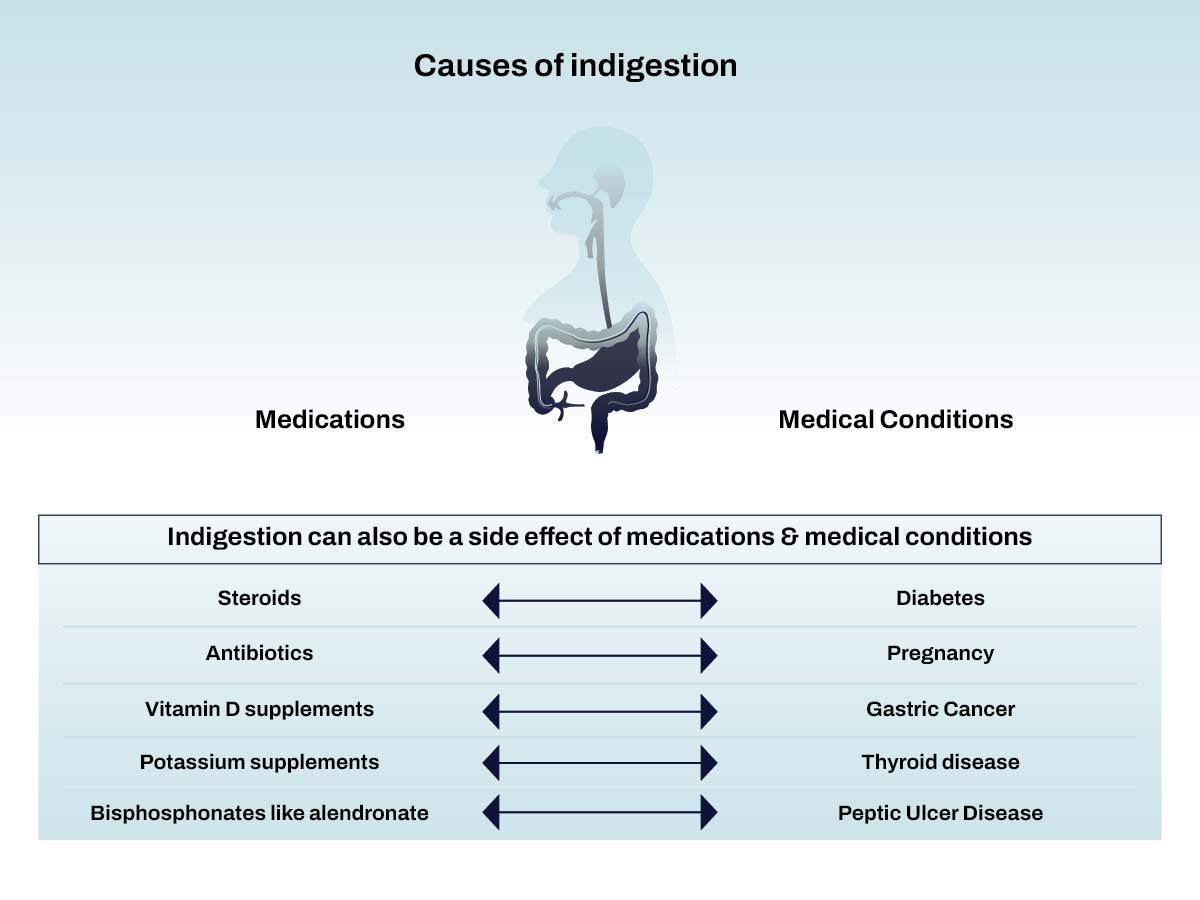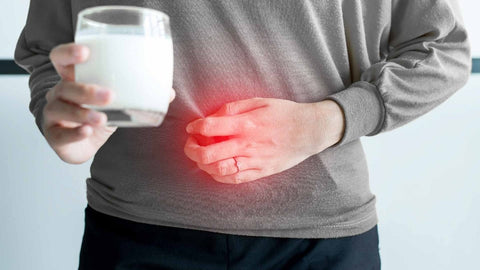Overview
Indigestion is a broad term that is used to define a collection of digestive symptoms such as bloating, heartburn, nausea, and more. It is also referred to as dyspepsia. There are several causes of indigestion, and sometimes it can be a sign of a serious condition of the digestive tract, such as peptic ulcer disease or stomach cancer.
Indigestion can be occasional or chronic (lasting frequently for a few weeks or months). Although indigestion is very common, people may experience symptoms differently. The symptoms of indigestion are related to the cause of indigestion and its severity. Mostly, indigestion is related to diet and lifestyle, but sometimes it can be associated with a disease related to the digestive tract.
In the article, we have explained common symptoms and causes of indigestion. We also intend to provide brief information on the diagnosis and treatment of indigestion.
Symptoms of indigestion
Symptoms of indigestion can vary from person to person depending on the cause, severity, and medical history.
A few common symptoms of indigestion are listed below:

- Feeling full too soon while eating a meal.
- Feeling uncomfortable abdominal fullness after eating a meal.
- Pain, discomfort, or a burning sensation in the upper abdomen
- Bloating: a feeling of abdominal swelling
- Burping, and farting
- Regurgitation: food or bitter-tasting fluids coming up into your mouth.
- Loud growling or gurgling in the stomach.
- Nausea: feeling sick or wanting to vomit.
- Vomiting.
- Excessive gas or belching
There are some severe symptoms of indigestion that are not common. However, if you have had these symptoms, you need to immediately see your doctor.
- Malena: black or tar-like stool, which is sticky and difficult to flush
- Repeated vomiting or blood in the vomit
- Unintentional weight loss
- Loss of appetite
- Difficulty swallowing or pain while shallowing, that gets worse over time
- Pain in the chest, neck, jaw, or arm
- Anemia: it can be suggested by tiredness and weakness
- Constant severe pain in the abdomen
- Shortness of breath
- Not able to pass stool or faltus
- Jaundice: yellow discoloration of eyes, and skin
Sometimes, indigestion symptoms get worsened due to complications associated with the underlying condition. A few such complications are:
- Esophageal stricture, with symptoms such as progressive difficulty in swallowing.
- Pyloric stenosis with the symptoms of severe projectile vomiting.
- Barrett’s esophagus with symptoms such as heartburn or regurgitation.
Causes of indigestion
There are different causes of indigestion. It can be related to your diet or lifestyle, certain medications, medical conditions, and psychological conditions.
Lifestyle
There are various aspects of lifestyle and habits that can cause indigestion. However, aspects related to your eating habits have a major role in causing symptoms.
Some common causes of indigestion related to lifestyle are:

- Eating too much
- Eating too fast
- Eating spicy or fatty foods.
- Lying down too soon after eating
- Smoking
- Alcohol consumption
- Stress
- Poor sleep hygiene
- Too much caffeine consumption
- Consumption of carbonated drinks
Indigestion due to these causes can be avoided by adopting a healthy lifestyle and limiting the risk factors.

Medication
Indigestion can also be a side effect of many medications. Some of the common medications causing indigestion are:
- Non-steroidal anti-inflammatory drugs like ibuprofen, diclofenac, mefenamic acid, aspirin, naproxen, and more
- Antibiotics
- Steroids
- Calcium channel blockers
- Bisphosphonates like alendronate (used for treating osteoporosis)
- Orlistat (used for treating obesity)
- Potassium supplements
- Acarbose (used in diabetes mellitus)
- Dabigatran (anticoagulant)
- Iron supplements
- Vitamin D supplements
Medical Conditions
Many disease conditions can cause indigestion. Most of the conditions are related to increased acid production. The symptoms are usually more severe, frequent, and chronic if the indigestion is due to certain medical conditions.
- Peptic Ulcer Disease: The condition is associated with ulcerations in the inner lining of the digestive tract due to increased gastric acid production and a loss of the protective lining of the digestive tract. It can be due to bacterial infections like Helicobacter pylori (H. pylori), medications like NSAIDs, or smoking.
The common symptom of peptic ulcer disease is upper abdominal pain or discomfort. It is usually related to food. In gastric ulcer, it occurs after food intake, and in duodenal ulcer, the pain is usually on an empty stomach. Other symptoms such as belching, abdominal fullness, feeling full early while eating, nausea, and vomiting might also be present.
-
Gastric Cancer: Indigestion can be a common symptom of gastric cancer. The chances of getting gastric cancer increase with age. Abdominal pain due to gastric cancer can be vague and mild early in the disease. But as the condition progresses, the pain becomes more severe and constant. Other symptoms and signs that can develop are anemia, weight loss, fatigue, and abdominal mass. So, gastric cancer must be ruled out if indigestion is progressive with anemia and weight loss.
-
Gastroesophageal reflux disease: it is a condition in which there is reflux of gastric content, causing discomfort and complications. Some classic symptoms of gastroesophageal reflux disease include heartburn and regurgitation. Other symptoms of GERD include dysphagia, chest pain, water brash, difficulty swallowing, chronic cough, nausea, and vomiting.
-
Gastritis: It is an inflammation of the stomach lining, mostly associated with increased acid secretion. The condition has symptoms similar to peptic ulcer disease, but less severe.
-
Irritable bowel syndrome: It is a functional disorder of the gastrointestinal tract characterized by chronic abdominal pain and altered bowel habits. The pain is cramping in nature, with variable intensity and periodic exacerbation.
- Lactose intolerance: The condition can be defined as a clinical syndrome in which there is indigestion of lactose or lactose-containing foods. The common symptoms associated with the condition are abdominal pain, bloating, flatulence, nausea, and diarrhea. The symptoms develop within a few hours after eating lactose-containing food.
- Gallstones: Stones in the gallbladder can also cause symptoms of digestion.
- Inflammatory bowel diseases: Chrohn’s disease and ulcerative colitis are inflammatory bowel diseases that cause inflammation of the digestive tract and cause indigestion.
- Celiac disease: The condition is associated with gluten sensitivity. Celiac disease can cause symptoms such as diarrhea, abdominal pain, and vomiting after the intake of food containing gluten.
- Pancreatitis: It is the inflammation of the pancreas. The common causes of pancreatitis are alcohol consumption and gallstones.
- Intestinal obstruction: Constipation, abdominal pain, and vomiting are the common symptoms of intestinal obstruction.
- Gastroparesis: It is a delay in gastric emptying due to result of the problem with the nerves and muscles that control gastric emptying
- Lack of blood supply to the digestive tract (Bowel Ischemia)
- Diabetes
- Pregnancy
- Thyroid disease
Functional cause
When no specific cause of the symptoms of indigestion is identified by clinical findings and tests, then the indigestion is due to a functional cause. The common symptoms of indigestion due to its functional cause are early fullness while eating, fullness soon after having a meal; bloating, and epigastric pain or burning sensation. Nausea, vomiting, and heartburn are less frequent. The exact mechanism behind the cause is not known.
Diagnosis of the cause

Your doctor might ask you specific questions regarding your symptoms, medical history, any medications, and complications associated with the cause of indigestion. This may be followed by a clinical examination.
Then, your doctor might order an investigation to rule out infection by Helicobacter pylori. The test can be done by collecting your blood, breath, or stool sample. Your doctor might also order an endoscopy examination of your upper gastrointestinal tract.
It is a process in which an endoscope, a pipe with a light bulb and camera attached to its end, is passed through the food pipe, and the image collected by the camera is examined on the monitor. The endoscope can also take tissue samples for examination under a microscope. Endoscopy might be ordered under the following conditions:
- You have unintentional weight loss.
- You are having difficulty or pain during swallowing.
- You have anemia
- You have persistent vomiting
- You have a family history of gastrointestinal cancer.
- A palpable mass or lymph node was found during the examination
- You are more than 60 years of age.
Treatment
Occasional indigestion does not require any treatment which relieves on its own. However, maintaining a healthy lifestyle and good eating habits might prevent occasional indigestion. Sometimes medicines can be used if the symptoms are persistent.
When the indigestion is more frequent and persists despite medicine, there might be an underlying medical cause for indigestion, which needs to be diagnosed, After the identification of the cause of indigestion, treatment for the specific cause should be started.
Conclusion
Indigestion is a common problem that can present with vague symptoms related to digestion. Although the condition is very common, it should not be ignored and you should be cautious when symptoms are severe, persistent, frequent, chronic, or associated with other systemic symptoms such as weight loss and fatigue.
Indigestion can be caused by various conditions, such as lifestyle, medical conditions, bacterial infections, medications, and functional disorders. The diagnosis and treatment of indigestion are focused on identifying the cause and providing an appropriate management plan for the cause.
So, if you are suffering from indigestion symptoms that are becoming difficult to manage, you need to see your healthcare provider. They will help to determine the underlying cause of the symptoms and provide treatment advice.
Watch AFIL test kits testimonial videos click here
Sources:
- Definition & Facts of Indigestion. (2022, July 22). National Institute of Diabetes and Digestive and Kidney Diseases; NIDDK | National Institute of Diabetes and Digestive and Kidney Diseases. https://www.niddk.nih.gov/health-information/digestive-diseases/indigestion-dyspepsia/definition-facts
- Kingham, J. G. C., Fairclough, P. D., & Dawson, A. M. (1983). What is indigestion?. Journal of the Royal Society of Medicine, 76(3), 183-186.
- Talley, N. J., Phung, N., & Kalantar, J. S. (2001). Indigestion: When is it functional?. Bmj, 323(7324), 1294-1297.
- Seager, J. M., & Hawkey, C. J. (2001). Indigestion and non-steroidal anti-inflammatory drugs. Bmj, 323(7323), 1236-1239.
- Jones, F. A. (1983). Indigestion. Journal of the Royal Society of Medicine, 76(3), 175-175.
- Bytzer, P., & Talley, N. J. (2001). Dyspepsia. Annals of internal medicine, 134(9_Part_2), 815-822.



.png?v=1737390083)
.png?v=1737187409)


